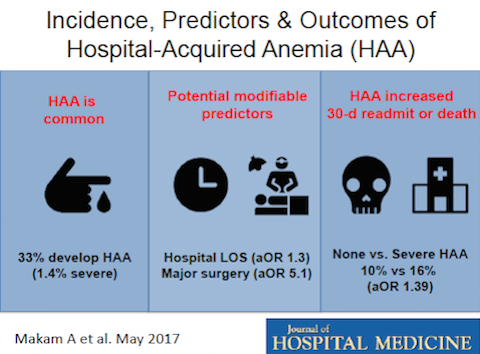Hospital-acquired anemia more common, increases risks

One in three patients hospitalized for medical problems experienced a drop in their red blood cell count due to the hospitalization - a concept called hospital-acquired anemia, new research showed.
Moreover, the worse the hospital-acquired anemia - or the more blood lost - the higher the risk of death or readmission, even after adjusting for other important factors, UT Southwestern Medical Center researchers reported in a study involving 11,000 patients cared for in six hospitals.
"This study shines a spotlight on a very common but underappreciated risk of hospitalization, hospital-acquired anemia, which has traditionally been viewed as an incidental change in the red blood count of no significance. However, our results showed that hospital-acquired anemia was associated with worse clinical outcomes after leaving the hospital so it needs to be taken more seriously," said senior author Dr. Ethan Halm, Director of UT Southwestern's Center for Patient-Centered Outcomes Research and Chief of the William T. and Gay F. Solomon Division of General Internal Medicine at UT Southwestern. Dr. Halm, Professor of Internal Medicine and Clinical Sciences, holds the Walter Family Distinguished Chair in Internal Medicine in Honor of Albert D. Roberts, M.D.

Hospital-acquired anemia is defined as having a normal blood count on admission but developing anemia during the course of hospitalization. The most severe form of hospital-acquired anemia was independently associated with a 39 percent increase in the odds of being readmitted or dying within 30 days after hospital discharge compared with not developing hospital-acquired anemia. The most severe form was defined as a hematocrit of 27 percent or less at the time of discharge, occurring in 1.4 percent of all hospitalizations in the study, which appears in the Journal of Hospital Medicine.
"This is the first study of post-discharge adverse outcomes of hospital-acquired anemia among a diverse group of patients who were hospitalized for different reasons," said lead author Dr. Anil Makam, Assistant Professor of Internal Medicine and Clinical Sciences and a member of the Center for Patient-Centered Outcomes Research. Other studies have examined post-discharge outcomes in patients hospitalized for heart attacks.
While the study does not establish preventability, it points to several directly associated risk factors of developing hospital-acquired anemia. "Our findings suggest that reducing blood loss during major surgeries and reducing unnecessary testing during hospital stays may lower a patient's risk of developing severe hospital-acquired anemia, and potentially improve their recovery," said Dr. Makam.
In the current study, researchers found that the two strongest potentially modifiable predictors of developing moderate or severe hospital-acquired anemia are length of hospital stay and patients undergoing major surgery. In the future, researchers hope to examine other patient-centered outcomes that may be related to hospital-acquired anemia, such as fatigue, functional impairment, and the trajectory of post-hospital recovery.

















